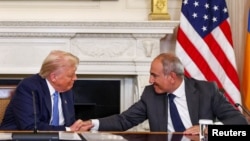“What did the prime minister of Armenia get [in Washington on August 8?]” he told a news conference. “He got a picture with President Trump's signature and a piece of paper with no legal force which gives him an opportunity to deceive the Armenian people once again.”
A joint declaration signed by Trump, Prime Minister Nikol Pashinian and Azerbaijani President Ilham Aliyev at the White House says, among other things, that Armenia will ensure “unhindered communication” between the Nakhichevan exclave and the rest of Azerbaijan through its Syunik province. It will also give the United States exclusive rights to that transit corridor that will be named the Trump Route for International Peace and Prosperity (TRIPP) and run along the Armenian-Iranian border.
Kocharian claimed that the TRIPP would allow the U.S. to have de facto control of the vital border while giving Azerbaijan an extraterritorial corridor to Nakhichevan demanded by Aliyev since the 2020 war in Nagorno-Karabakh.
Pashinian maintains that the TRIPP will not compromise Armenian sovereignty over the strategic area. But he has made ambiguous statements about border crossing procedures that are due to be put in place for Azerbaijani travelers and cargo.
Speaking during the August 8 signing ceremony, Trump appeared to confirm reports that the U.S. government will secure a long-term lease on the transit route. According to unnamed U.S. officials quoted by Western media, Washington will then sublease the land to a consortium of private companies.
Armenian officials have implicitly denied this. Foreign Minister Ararat Mirzoyan said last week that the TRIPP will be built and operated by a U.S.-Armenian “consortium.”
Kocharian insisted that the consortium or any other entity managing the corridor would not be controlled by the Armenian government.
“Do you think that Armenia will be able to dictate anything on a road that the U.S. will be standing behind? Are we really that naive?” he asked.
The Washington talks also resulted in the initialing of an Armenian-Azerbaijani peace treaty. Although Aliyev continues to make its signing conditional on a change of Armenia’s constitution, Pashinian has repeatedly declared since August 8 that “peace has been established” between the two South Caucasus nations.
Kocharian dismissed those claims. He said what Armenia and Azerbaijan have now is a ceasefire, not peace, which Aliyev could violate at any moment.
The 71-year-old ex-president, who ruled Armenia from 1998-2008, is the top leader of the main opposition Hayastan alliance that finished second in the last general elections held in 2021. He reaffirmed on Tuesday his intention to participate in the next elections due in June 2026. He insisted that Pashinian stands no chance of winning them.
Kocharian would not say who will be part of his political team this time around. He said this should be clear by next January or February.





